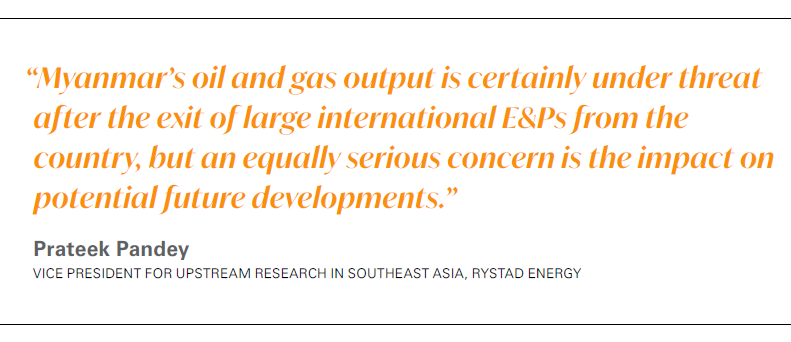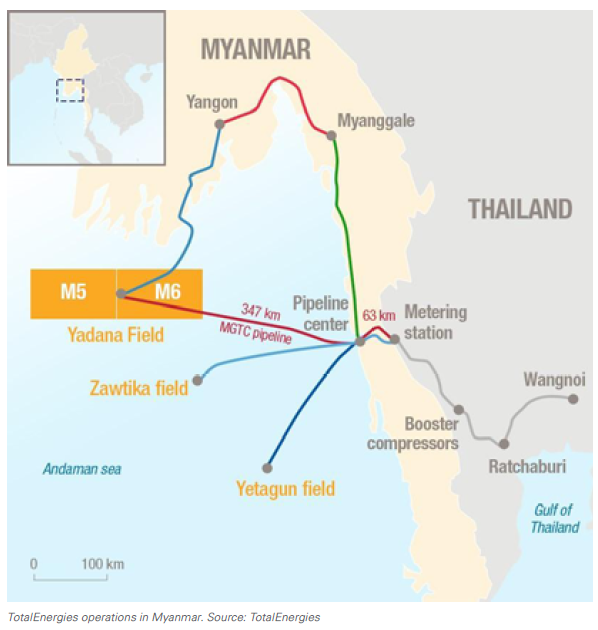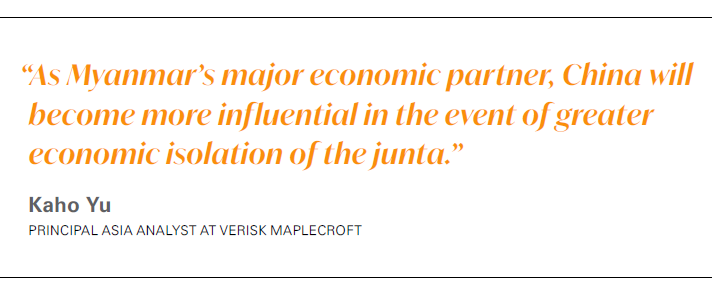Myanmar’s oil, gas output at risk as majors exit [Gas in Transition]
In the past couple of months major international oil and gas companies have announced their exit from Myanmar, citing worsening abuses and human rights violations in the country following last year’s coup. The US, the EU, the UK and Canada have all imposed sanctions on Myanmar's military junta. And analysts believe Myanmar’s oil and gas output is now under threat, both in the immediate and long-term.
France’s TotalEnergies and US major Chevron said in late January they were withdrawing from the southeast Asian nation. TotalEnergies will formally exit from the offshore Yadana gas field, Myanmar’s biggest, within six months. It operates the Yadana gas field and is partnered with Chevron, Thai state-owned PTTEP and Myanma Oil and Gas Enterprise (MOGE), a state-owned enterprise of Myanmar. MOGE collects revenues on behalf of the government.
The Yadana field produces around 6bn m³/yr of gas, of which more than two thirds is exported to Thailand and the rest goes to state-owned MOGA for use in the local market.
Australia’s Woodside also announced its withdrawal in late January. Malaysia's Petronas and Japan's Mitsubishi are meanwhile divesting their stakes in Myanmar’s Yetagun gas field, Reuters reported late last month.
Woodside has operated in Myanmar since 2013 and holds a 40% interest in the A-6 joint venture as joint operator, with additional interests in the AD-1 and AD-8 exploration permits..
Petronas, the operator of Yetagun field, signed agreements for the sale of its upstream operations in Myanmar in July last year, though the transaction is yet to be completed. The Malaysian firm has a 40.9% stake in Yetagun, while Myanma Oil and Gas Enterprise owns 20.5%.
Mitsubishi indirectly holds a 1.93% stake in the Yetagunfield while a Japanese consortium, led by the Japanese government and JX Nippon Oil & Gas Exploration, a unit of oil refinery Eneos Holdings, has a 19.3% stake, while the remainder is owned by Thai PTTEP.
“Myanmar's oil and gas output is certainly under threat after the exit of large international E&Ps from the country, but an equally serious concern is the impact on potential future developments,” says Prateek Pandey, vice president for upstream research in Southeast Asia at Rystad Energy.
“TotalEnergies’ exit is probably the biggest blow, considering it was operator for around 50% of domestic production and also operator for one of country's largest potential development at Block A-6 with investment of around $2bn along with Woodside and Myanmar Petroleum Resources as other partners,” Pandey adds.
Through their exit, these companies are abandoning around 500mn barrels of oil equivalent resources at a pre-final investment decision stage, Pandey estimates, and output from the country's largest block is at major risk.
The last LNG import into Myanmar was in 2021. Although the country is a relatively small LNG market, this demand destruction is likely to continue. Pandey says that the overall gas demand is also likely down due to the closure of around 700 MW of power capacity that is no longer financially viable to operate after the international spike in LNG prices.
Kaho Yu, principal Asia analyst at Verisk Maplecroft says that the withdrawal of international oil companies from Myanmar reflects that since the start of the coup in February 2021, the deteriorating political environment has created significant uncertainties for the country's upstream sector.
“It also means that domestic oil and gas production has to rely on a limited number of remaining operators with exploration activities set to decrease,” Yu adds.
Calls for sanctions on MOGA
Leading international non-government organisations (NGOs) have welcomed sanctions on junta-linked entities but have raised alarms that the derogation, which expressly allows EU oil and gas operators remaining in Myanmar to pursue financial transactions with MOGA, may render the measures ineffective.
The Brussels-based International Federation for Human Rights (FIDH) says that the derogation represents a significant missed opportunity for the EU, its member states, and its business sector to uphold their international human rights obligations.
 “The EU's decision to freeze economic and financial flows to MOGE could have been a critical opportunity to reduce the violence unleashed by the brutal junta on civilians. Regrettably, by adopting a derogation, EU member states undermine their own credibility and claims to support human rights and democracy,” FIDH says.
“The EU's decision to freeze economic and financial flows to MOGE could have been a critical opportunity to reduce the violence unleashed by the brutal junta on civilians. Regrettably, by adopting a derogation, EU member states undermine their own credibility and claims to support human rights and democracy,” FIDH says.
The NGO argues that the country’s natural gas industry is relatively unaffected by international sanctions, even though it generates $1.0-1.5bn annually in revenues for the military and represents up to 50% of the regime’s foreign currency inflow.
“EU sanctions against MOGE were expected to significantly hamper the military's access to foreign currency, including from French oil giant TotalEnergies, which had been a key investor in this sector in Myanmar,” FIDH says. “However, the listing of MOGE is undermined by a dangerous derogation, which would enable existing transactions between EU operators and MOGE to be pursued despite the sanction regime.”
More sanctions on the way
Analysts say that now that TotalEnergies, Chevron and Woodside have officially exited, formal sanctions against MOGE seem increasingly likely. Pandey believes that if the state-owned entity is sanctioned, this will raise concerns for smaller regional players still working in the country.
“TotalEnergies is still operating in the country for around six months until its contractual period ends. But the sanctions on MOGE are more likely following the exit of these players from the country, which will be a concern for other regional players and NOCs [national oil companies] as well that hold assets in the country,” Pandey says. “For most international players, it's becoming increasingly difficult to operate in Myanmar. The players will be cautious of additional investments unless there is more clarity on response from the US and EU on the current situation.”
The fact that around 40% of Thailand's gas imports are dependent on Yadana, makes it a difficult decision for PTTEP to exit the block. However, PTTEP will also be aware of challenges with operating in Myanmar, and will be reluctant to commit to the additional investment needed to maintain production at the mature field.
“Although PTTEP appears most likely candidate to take over as operator, it would carefully decide on the opportunity considering it would be operating around 70% Myanmar’s production if it replaces TotalEnergies and Chevron in the Yadana fields,” Pandey says.
With the junta becoming increasingly isolated from the west, Chinese influence in Myanmar’s oil and gas sector is expected to grow.
“As Myanmar’s major economic partner, China will become more influential in the event of greater economic isolation of the junta. As Western companies become increasingly wary of investing in Myanmar, Chinese companies with a higher risk appetite than their western counterparts will enjoy an upper hand in project competition in Myanmar,” Yu says.



